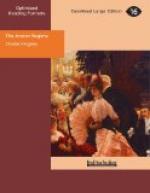and common humanity. It was this, I believe,
which gave them their moral force. It was this
which drew towards them the hearts, not merely of
educated bourgeois and nobles (on the
menu peuple
they had no influence, and did not care to have any),
but of every continental sovereign who felt in himself
higher aspirations than those of a mere selfish tyrant—Frederick
the Great, Christina of Sweden, Joseph of Austria,
and even that fallen Juno, Catharine of Russia, with
all her sins. To take the most extreme instance—Voltaire.
We may question his being a philosopher at all.
We may deny that he had even a tincture of formal
philosophy. We may doubt much whether he had
any of that human and humorous common sense, which
is often a good substitute for the philosophy of the
schools. We may feel against him a just and
honest indignation when we remember that he dared to
travestie into a foul satire the tale of his country’s
purest and noblest heroine; but we must recollect,
at the same time, that he did a public service to
the morality of his own country, and of all Europe,
by his indignation—quite as just and honest
as any which we may feel—at the legal murder
of Calas. We must recollect that, if he exposes
baseness and foulness with too cynical a license of
speech (in which, indeed, he sinned no more than had
the average of French writers since the days of Montaigne),
he at least never advocates them, as did Le Sage.
We must recollect that, scattered throughout his
writings, are words in favour of that which is just,
merciful, magnanimous, and even, at times, in favour
of that which is pure; which proves that in Voltaire,
as in most men, there was a double self—the
one sickened to cynicism by the iniquity and folly
which he saw around him—the other, hungering
after a nobler life, and possibly exciting that hunger
in one and another, here and there, who admired him
for other reasons than the educated mob, which cried
after him “Vive la Pucelle.”
Rousseau, too. Easy it is to feel disgust, contempt,
for the “Confessions” and the “Nouvelle
Heloise”—for much, too much, in the
man’s own life and character. One would
think the worse of the young Englishman who did not
so feel, and express his feelings roundly and roughly.
But all young Englishmen should recollect, that to
Rousseau’s “Emile” they owe their
deliverance from the useless pedantries, the degrading
brutalities, of the medieval system of school education;
that “Emile” awakened throughout civilised
Europe a conception of education just, humane, rational,
truly scientific, because founded upon facts; that
if it had not been written by one writhing under the
bitter consequences of mis-education, and feeling
their sting and their brand day by day on his own
spirit, Miss Edgeworth might never have reformed our
nurseries, or Dr. Arnold our public schools.




